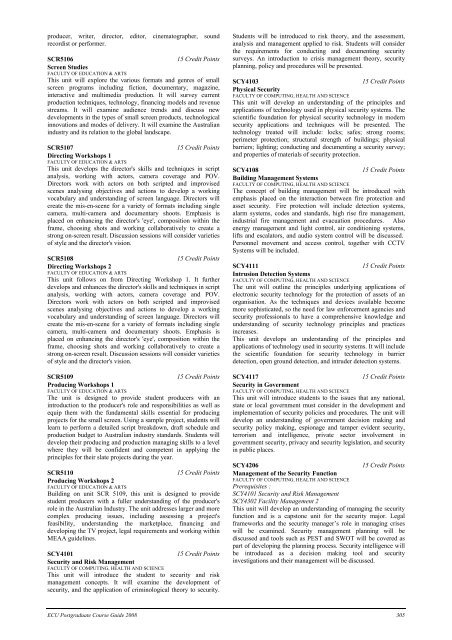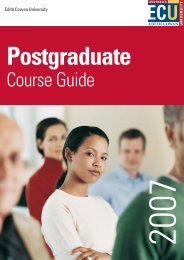Postgraduate - Edith Cowan University
Postgraduate - Edith Cowan University
Postgraduate - Edith Cowan University
Create successful ePaper yourself
Turn your PDF publications into a flip-book with our unique Google optimized e-Paper software.
producer, writer, director, editor, cinematographer, sound<br />
recordist or performer.<br />
SCR5106 15 Credit Points<br />
Screen Studies<br />
FACULTY OF EDUCATION & ARTS<br />
This unit will explore the various formats and genres of small<br />
screen programs including fiction, documentary, magazine,<br />
interactive and multimedia production. It will survey current<br />
production techniques, technology, financing models and revenue<br />
streams. It will examine audience trends and discuss new<br />
developments in the types of small screen products, technological<br />
innovations and modes of delivery. It will examine the Australian<br />
industry and its relation to the global landscape.<br />
SCR5107 15 Credit Points<br />
Directing Workshops 1<br />
FACULTY OF EDUCATION & ARTS<br />
This unit develops the director's skills and techniques in script<br />
analysis, working with actors, camera coverage and POV.<br />
Directors work with actors on both scripted and improvised<br />
scenes analysing objectives and actions to develop a working<br />
vocabulary and understanding of screen language. Directors will<br />
create the mis-en-scene for a variety of formats including single<br />
camera, multi-camera and documentary shoots. Emphasis is<br />
placed on enhancing the director's 'eye', composition within the<br />
frame, choosing shots and working collaboratively to create a<br />
strong on-screen result. Discussion sessions will consider varieties<br />
of style and the director's vision.<br />
SCR5108 15 Credit Points<br />
Directing Workshops 2<br />
FACULTY OF EDUCATION & ARTS<br />
This unit follows on from Directing Workshop 1. It further<br />
develops and enhances the director's skills and techniques in script<br />
analysis, working with actors, camera coverage and POV.<br />
Directors work with actors on both scripted and improvised<br />
scenes analysing objectives and actions to develop a working<br />
vocabulary and understanding of screen language. Directors will<br />
create the mis-en-scene for a variety of formats including single<br />
camera, multi-camera and documentary shoots. Emphasis is<br />
placed on enhancing the director's 'eye', composition within the<br />
frame, choosing shots and working collaboratively to create a<br />
strong on-screen result. Discussion sessions will consider varieties<br />
of style and the director's vision.<br />
SCR5109 15 Credit Points<br />
Producing Workshops 1<br />
FACULTY OF EDUCATION & ARTS<br />
The unit is designed to provide student producers with an<br />
introduction to the producer's role and responsibilities as well as<br />
equip them with the fundamental skills essential for producing<br />
projects for the small screen. Using a sample project, students will<br />
learn to perform a detailed script breakdown, draft schedule and<br />
production budget to Australian industry standards. Students will<br />
develop their producing and production managing skills to a level<br />
where they will be confident and competent in applying the<br />
principles for their slate projects during the year.<br />
SCR5110 15 Credit Points<br />
Producing Workshops 2<br />
FACULTY OF EDUCATION & ARTS<br />
Building on unit SCR 5109, this unit is designed to provide<br />
student producers with a fuller understanding of the producer's<br />
role in the Australian Industry. The unit addresses larger and more<br />
complex producing issues, including assessing a project's<br />
feasibility, understanding the marketplace, financing and<br />
developing the TV project, legal requirements and working within<br />
MEAA guidelines.<br />
SCY4101 15 Credit Points<br />
Security and Risk Management<br />
FACULTY OF COMPUTING, HEALTH AND SCIENCE<br />
This unit will introduce the student to security and risk<br />
management concepts. It will examine the development of<br />
security, and the application of criminological theory to security.<br />
Students will be introduced to risk theory, and the assessment,<br />
analysis and management applied to risk. Students will consider<br />
the requirements for conducting and documenting security<br />
surveys. An introduction to crisis management theory, security<br />
planning, policy and procedures will be presented.<br />
SCY4103 15 Credit Points<br />
Physical Security<br />
FACULTY OF COMPUTING, HEALTH AND SCIENCE<br />
This unit will develop an understanding of the principles and<br />
applications of technology used in physical security systems. The<br />
scientific foundation for physical security technology in modern<br />
security applications and techniques will be presented. The<br />
technology treated will include: locks; safes; strong rooms;<br />
perimeter protection; structural strength of buildings; physical<br />
barriers; lighting; conducting and documenting a security survey;<br />
and properties of materials of security protection.<br />
SCY4108 15 Credit Points<br />
Building Management Systems<br />
FACULTY OF COMPUTING, HEALTH AND SCIENCE<br />
The concept of building management will be introduced with<br />
emphasis placed on the interaction between fire protection and<br />
asset security. Fire protection will include detection systems,<br />
alarm systems, codes and standards, high rise fire management,<br />
industrial fire management and evacuation procedures. Also<br />
energy management and light control, air conditioning systems,<br />
lifts and escalators, and audio system control will be discussed.<br />
Personnel movement and access control, together with CCTV<br />
Systems will be included.<br />
SCY4111 15 Credit Points<br />
Intrusion Detection Systems<br />
FACULTY OF COMPUTING, HEALTH AND SCIENCE<br />
The unit will outline the principles underlying applications of<br />
electronic security technology for the protection of assets of an<br />
organisation. As the techniques and devices available become<br />
more sophisticated, so the need for law enforcement agencies and<br />
security professionals to have a comprehensive knowledge and<br />
understanding of security technology principles and practices<br />
increases.<br />
This unit develops an understanding of the principles and<br />
applications of technology used in security systems. It will include<br />
the scientific foundation for security technology in barrier<br />
detection, open ground detection, and intruder detection systems.<br />
SCY4117 15 Credit Points<br />
Security in Government<br />
FACULTY OF COMPUTING, HEALTH AND SCIENCE<br />
This unit will introduce students to the issues that any national,<br />
state or local government must consider in the development and<br />
implementation of security policies and procedures. The unit will<br />
develop an understanding of government decision making and<br />
security policy making, espionage and tamper evident security,<br />
terrorism and intelligence, private sector involvement in<br />
government security, privacy and security legislation, and security<br />
in public places.<br />
SCY4206 15 Credit Points<br />
Management of the Security Function<br />
FACULTY OF COMPUTING, HEALTH AND SCIENCE<br />
Prerequisites :<br />
SCY4101 Security and Risk Management<br />
SCY4302 Facility Management 2<br />
This unit will develop an understanding of managing the security<br />
function and is a capstone unit for the security major. Legal<br />
frameworks and the security manager’s role in managing crises<br />
will be examined. Security management planning will be<br />
discussed and tools such as PEST and SWOT will be covered as<br />
part of developing the planning process. Security intelligence will<br />
be introduced as a decision making tool and security<br />
investigations and their management will be discussed.<br />
ECU <strong>Postgraduate</strong> Course Guide 2008 305



